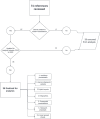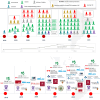Strengthening public health education and humanitarian response through academic volunteerism
- PMID: 39833812
- PMCID: PMC11744964
- DOI: 10.1186/s12909-025-06676-z
Strengthening public health education and humanitarian response through academic volunteerism
Abstract
Introduction: Volunteers are an integral part of the International Red Cross and Red Crescent (RCRC) Movement, with over 16 million people actively contributing to humanitarian action worldwide. Academic volunteerism within the Movement includes contributions from students, volunteers and professionals from academic institutions who offer their time and expertise. In this study we aimed to understand the process of embedding academic volunteers in humanitarian organizations such as the Canadian Red Cross (CRC) and assess the impact of their activities within the realm of public health education.
Methods: We used a qualitative case study design with an instrumental approach. All documents related to academic volunteers within the CRC database from September 2018 to August 2023 were gathered and reviewed. Data related to the processes around engaging with volunteers, timelines, outcomes and feedback surveys from students and staff members were extracted and a content analysis was conducted. A return-on-investment analysis (ROI) was conducted to assess the financial impact of engaging academic volunteers.
Results: A total of 68 academic volunteers were engaged with CRC, including unpaid or partially paid master's students, doctoral and postdoctoral fellows, and student volunteers. The collaboration between CRC and academic volunteers contributed to educational enrichment, professional development, knowledge transfer, operational efficiency, and talent pool expansion. Results from a survey on academic volunteerism further highlighted benefits such as maintaining project schedules, promoting diversity, and amplifying the Movement's voice on important matters. The return on investment for unpaid academic volunteers and Masters students was 70%. A five-fold increase was measured for partially paid academic volunteers resulting in 486% ROI.
Discussion: Academic volunteerism yields mutual benefits for students, academic researchers, and humanitarian organizations. These volunteers enhance operational efficiency and fortify resilience, fostering adaptability amid challenges. They play a crucial role in strengthening evidence-based programming within organizations like CRC and bolstering their capacity to address emerging health issues. These volunteers constitute a valuable talent pool, bringing organizational knowledge and experience to the table. They provide critical support for scaling up programs, especially during emergency situations, offering innovative solutions to address human resource shortages driven by funding constraints.
Keywords: Academic volunteerism; Humanitarian work; Public health education.
© 2025. The Author(s).
Conflict of interest statement
Declarations. Ethics approval and consent to participate: This study entailed document reviews, using CRC quality assurance data and reports and data available in the public domain. No data involving human subjects was collected for research purposes. Consent for publications: Not applicable. Competing interests: FR, MA,IO and SS are current employees of the Canadian Red Cross, the organization’s work was used as a case study for this research. FA and AFK do not have any competing interests.
Figures
Similar articles
-
Innovation in Graduate Education for Health Professionals in Humanitarian Emergencies.Prehosp Disaster Med. 2016 Oct;31(5):532-8. doi: 10.1017/S1049023X16000650. Epub 2016 Aug 5. Prehosp Disaster Med. 2016. PMID: 27492749 Free PMC article.
-
Volunteerism during humanitarian crises: a practical guide.Crit Care. 2022 Apr 19;26(1):111. doi: 10.1186/s13054-022-03984-4. Crit Care. 2022. PMID: 35440031 Free PMC article. Review.
-
Impact of summer programmes on the outcomes of disadvantaged or 'at risk' young people: A systematic review.Campbell Syst Rev. 2024 Jun 13;20(2):e1406. doi: 10.1002/cl2.1406. eCollection 2024 Jun. Campbell Syst Rev. 2024. PMID: 38873396 Free PMC article. Review.
-
Student and educator experiences of maternal-child simulation-based learning: a systematic review of qualitative evidence protocol.JBI Database System Rev Implement Rep. 2015 Jan;13(1):14-26. doi: 10.11124/jbisrir-2015-1694. JBI Database System Rev Implement Rep. 2015. PMID: 26447004
-
The future of Cochrane Neonatal.Early Hum Dev. 2020 Nov;150:105191. doi: 10.1016/j.earlhumdev.2020.105191. Epub 2020 Sep 12. Early Hum Dev. 2020. PMID: 33036834
References
-
- Bernard Harris, Morris A, Ascough RS, Chikoto GL, Elson PR, McLoughlin J, et al. History of Associations and Volunteering. In: The Palgrave Handbook of Volunteering, Civic Participation, and Nonprofit Associations. London: Palgrave Macmillan; 2016;23–58.
-
- IFRC. Protect. promote. recognize. Advocacy Rep. 2011;1–23.
-
- IFRC. Our volunteers. 2023. Available from:https://www.ifrc.org/get-involved/volunteer-us/our-volunteers . Cited 2023 Sep 8.
-
- Snyder M. Psychology of volunteerism. In: International Encyclopdeia of the Social and Behavioural Sceinces. 2001;16308–11.
-
- Meijeren M, Lubbers M, Scheepers P. Socio-Structural Determinants in Volunteering for Humanitarian Organizations: A Resource-Based Approach. Nonprofit Volunt Sect Q. 2023;52(4):1058–76.
MeSH terms
LinkOut - more resources
Full Text Sources




